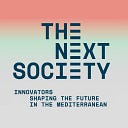BUSINESS AND TECH PARTNERSHIPS BYPASS THE COVID-19 CRISIS!
THE NEXT SOCIETY relaunches its mentoring programme between 26 cluster practitioners from both shores of the Mediterranean
After a successful first edition led by France Clusters, the Cluster Mentoring Reloaded programme is managed by ACCIÓ (Catalonia Trade & Investment) as part of THE NEXT SOCIETY action plan initiated by ANIMA Investment Network and co-funded by the European Union. It will support the development of cluster management practices and provide inspiration to foster cooperation between Mediterranean and European countries.
On January 20, 2021, the kick-off event of the Cluster Mentoring Reloaded programme was held online with the 13 pairs matching cluster managers and practitioners from Egypt, Jordan, Morocco, Palestine, and Tunisia, the mentees, with 13 mentors from France, Italy, Palestine, and Spain. The pairs will work hand-in-hand for the next ten months, until October 2021.
During this period, they will hold three joint meetings and will benefit from bilateral and group mentoring sessions. COVID-19’s current travelling limitations has turned the programme into the fully online modality, but this challenge has been a driver to make the most of available online tools for exchange and communication. It is expected that the programme, understood as a learning journey for all the participants, will have an impact on improving key management competences to provide more added value services to the clusters’ members and to start concrete collaboration relationships amongst the participant clusters.
THE NEXT SOCIETY’s community newcomers!
In Morocco, 6 cluster practitioners have joined the Cluster Mentoring Reloaded Programme. They represent the Maroc Numeric Cluster, the Moroccan Technical Textile Cluster (C2TM), the Cluster Electronique, Mécatronique & Mécanique (CE3M) and the Agrinova Competitiveness Pole.
Furthermore, 7 clusters from Egypt, the Egyptian Renewable Energy Cluster; Palestine, the House of Furniture and the Hebron Leather and Shoe clusters; Tunisia, the Mechatronic Cluster, the North-West Olive Oil Cluster and the Marble Cluster; and Jordan, the ICT Association of Jordan — int@j, have been selected to benefit from THE NEXT SOCIETY tailor-made cluster support.
To know more about the profiles, download the portfolio.
A throwback to MENA clustering framework and emergence
In Morocco, the commitment to the development of innovation has mobilised both public authorities and private decision-makers since June 2009, when the collective awareness was consecrated by the “Morocco Innovation initiative” and the creation of clusters through public support, tenders and collaborative projects emerged as one of its tools. Today 11 clusters exist under a national label and 6 of them received a Bronze Label of the European Cluster Excellence Initiative in 2014.
In Egypt, since 2016, the government has made cluster-based industrialisation a key pillar of Egypt’s sustainable development strategy until 2030 and developed the establishment of 22 industrial clusters all over the country. Furthermore, the Technology Innovation and Entrepreneurship Center (TIEC) from the Information Technology Industry Development Agency (ITIDA), partner of THE NEXT SOCIETY in Egypt, also launched the Innovation Cluster Initiative (ICI) in 2016.
Between 2012 and 2016 in Palestine, the Private Sector Development Cluster Project (PSDCP) was implemented by the Ministry of National Economy and the Federation of Palestinian Chambers of Commerce, Industry and Agriculture and aimed at providing a foundation for sustainable economic development with a cluster approach. It started with 5 pilot clusters, 4 in the West Bank and 1 in the Gaza strip.
The clustering approach in Tunisia has been supported by public authorities since the beginning of 2010s and clusters have emerged in the framework of technopoles and competitiveness as a result of the commitment of local actors and the support of international funding. Since then, 10 technopoles and competitiveness poles in Tunisia emerged and a clustering policy was implemented in 2013.
In Jordan, there are no clusters in the sense of a regional ecosystem of related industries and competences featuring a broad set of inter-industry channels. However, in 2014, the National Innovation and Competitiveness Council was reactivated to identify and further respond to the challenges facing the development of innovation. The strategy focused on six priority clusters, the same ones as those identified by the Jordan 2025 Vision and the Jordan Economic Growth Plan (medical services and pharmaceutical industry; information and telecommunications technology; clean technologies; architecture and engineering services; education and career guidance services; banking and financial services). That is the reason why the ICT Association of Jordan — int@j and OASIS500 are considered the two reference clusters within THE NEXT SOCIETY community.
THE NEXT SOCIETY Cluster Booster Track: a complete action plan for MENA cluster managers and their members!
The Cluster Mentoring Reloaded programme is launched in the context of the Cluster Booster Track, an exciting peer-to-peer learning and booster programme which helps cluster managers from the MENA region improve their management skills, multiply their business opportunities, and open new channels of interclustering collaboration at national, regional and international level.
The programme combines peer training and capacity building with business development missions giving MENA clusters international visibility. All actions help develop the strategic cooperation between EU & MENA clusters, supporting the creation of a strong cluster community. In order to sustain and support regular exchanges among this community, the online collaborative network i-Community has been created and welcomes cluster members from both regions.
Download the press release PDF.
